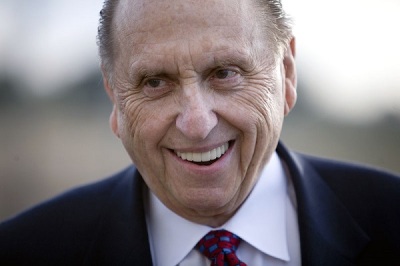Mormon church president Thomas S. Monson issues deposition subpoena for sexual abuse lawsuits

Thomas S. Monson, president of The Church of Jesus Christ of Latter-Day Saints, was issued a subpoena for deposition in sexual abuse lawsuits.
The subpoena orders Monson to appear in court on Aug. 4.
It was filed by lawyers of four people — two men and two women — from Navajo Nation, who claimed they had suffered from sexual abuse during a placement program sponsored by the Mormon church that ran in the 1960s and 1970s.
Under the program, called the "Indian Student Placement Program," Navajo youths were put in the care of LDS foster families after being baptized as Mormon. They stayed with their forster families for the school year and returned home in the summer.
According to the lawsuit, the four plaintiffs suffered from sexual abuse while they were in their foster families. Some of them said they reported it to church officials, who allegedly did not take appropriate action.
One of the plaintiffs said the program was part of the church's goal to convert Navajo children to the Mormon faith.
Craig Vernon, an attorney for one of the victims, believed Monson could provide "unique information" that could help the case, thus it it necessary for him to testify in court.
"What President Monson knew or didn't know about this and child sexual abuse within this program in general, is relevant," wrote Vernon, according to Fox 13. "If President Monson claims no knowledge, that too is relevant to what the Church knew or should have known about Lee and his ability to lead this program within the boundaries of the Navajo Nation and protect Indian Placement Program's children from sexual harm."
Vernon was referring to George Lee, former church general authority of LDS who was excommunicated in 1989 on grounds of sexual abuse.
On July 21, lawyers from the LDS church filed a motion to quash the subpoena, saying requiring Monson to testify in court is "improper."
The motion stated that Monson's only connection to the case was that he was a senior church leader when the alleged abuse took place.
"[The attorneys'] subpoena should be seen for what it is — a tactical maneuver calculated to burden the apex leader of the LDS Church in a misguided attempt to create leverage in the litigation," the motion said, as reported by Deseret News.
 Christians don't have to affirm transgenderism, but they can’t express that view at work: tribunal
Christians don't have to affirm transgenderism, but they can’t express that view at work: tribunal Archaeology discovery: Medieval Christian prayer beads found on Holy Island
Archaeology discovery: Medieval Christian prayer beads found on Holy Island Presbyterian Church in America votes to leave National Association of Evangelicals
Presbyterian Church in America votes to leave National Association of Evangelicals Over 50 killed in 'vile and satanic' attack at Nigerian church on Pentecost Sunday
Over 50 killed in 'vile and satanic' attack at Nigerian church on Pentecost Sunday Ukrainian Orthodox Church severs ties with Moscow over Patriarch Kirill's support for Putin's war
Ukrainian Orthodox Church severs ties with Moscow over Patriarch Kirill's support for Putin's war Islamic State kills 20 Nigerian Christians as revenge for US airstrike
Islamic State kills 20 Nigerian Christians as revenge for US airstrike Man who served 33 years in prison for murder leads inmates to Christ
Man who served 33 years in prison for murder leads inmates to Christ


 Nigerian student beaten to death, body burned over ‘blasphemous’ WhatsApp message
Nigerian student beaten to death, body burned over ‘blasphemous’ WhatsApp message 'A new low': World reacts after Hong Kong arrests 90-year-old Cardinal Joseph Zen
'A new low': World reacts after Hong Kong arrests 90-year-old Cardinal Joseph Zen Iran sentences Christian man to 10 years in prison for hosting house church worship gathering
Iran sentences Christian man to 10 years in prison for hosting house church worship gathering French Guyana: Pastor shot dead, church set on fire after meeting delegation of Evangelicals
French Guyana: Pastor shot dead, church set on fire after meeting delegation of Evangelicals ‘Talking Jesus’ report finds only 6% of UK adults identify as practicing Christians
‘Talking Jesus’ report finds only 6% of UK adults identify as practicing Christians Mission Eurasia ministry center blown up in Ukraine, hundreds of Bibles destroyed: 'God will provide'
Mission Eurasia ministry center blown up in Ukraine, hundreds of Bibles destroyed: 'God will provide' Church holds service for first time after ISIS desecrated it 8 years ago
Church holds service for first time after ISIS desecrated it 8 years ago Burger King apologizes for 'offensive campaign' using Jesus' words at the Last Supper
Burger King apologizes for 'offensive campaign' using Jesus' words at the Last Supper Uganda: Muslims abduct teacher, burn him inside mosque for praying in Christ’s name
Uganda: Muslims abduct teacher, burn him inside mosque for praying in Christ’s name